GRASSROOTS GOVERNANCE EXTENDS REACH TO WIN TRUST, ADDRESS WIDESPREAD ISSUES
Guangxi communities follow Xi's instruction, build strong foundations, connections

In 2023, 34-year-old Ma Jun moved his family of six from the Xinjiang Uygur autonomous region in the far northwest of China to the Guangxi Zhuang autonomous region in the southwest to open a halal noodle shop.
However, his greatest concern was not his new business, but the fact that his daughter was unable to attend the local school for compulsory education.
When all his attempts to remedy the situation failed, he did not expect that the Panlong community in Nanning, the capital of Guangxi, where his family lives, would solve this problem within just two weeks.
This success challenges the stereotype that a community or residents' committee, the most grassroots government organization in China, only handles trivial neighborhood matters.
Panlong has a permanent population of 30,000, one-third of whom are from ethnic minority groups such as the Zhuang, Yao and Miao. Many of them have come from other places in China to work or start businesses.
The community has addressed significant issues for those living and working there, such as mediating loan disputes and organizing free consultations with lawyers and psychologists.
In December 2023, President Xi Jinping visited Panlong during an inspection tour of Guangxi, engaging warmly with local residents.
Xi emphasized that communities are the basic units of grassroots self-governance and the foundation of the country's governance system. He added that through the community platform, addressing people's livelihood issues and public affairs while actively responding to public concerns is a significant advantage of grassroots governance with Chinese characteristics.
Xi also stressed that building interconnected communities is an important way to promote exchanges and interactions among people of different ethnic groups, noting that solid grassroots community construction, effective community services, and diverse activities would foster a strong sense of unity among all ethnic groups.
Meeting urgent needs
After Ma, a member of the Dongxiang ethnic group, moved from Xinjiang's Ili Kazak autonomous prefecture to Nanning, he was joined by his father, wife, and three young daughters in March last year to begin a new life together.
Ma's business was quite busy during lunch and dinner hours, but the family faced a new challenge. Their eldest daughter, a third grader, couldn't enroll in primary school due to a lack of procedures for schooling outside their hometown.
Ma inquired at several nearby schools and the local education department about the predicament, but they lacked the capacity to deal with it, or, required documentation for the child's enrollment.
"I was very anxious," he said. "Other children were attending school as usual, but mine had to stay home. If she couldn't attend school soon, she would miss the semester."
With nowhere else to turn, Ma sought help from Panlong community, explaining his situation to Gan Lu, the deputy director of the residents' committee.
The next day, Gan, along with other community workers, visited Ma's noodle shop, where the family of six lived, to learn about the situation.
Gan quickly reported Ma's case to Liangqing district education department officials, who three days later dispatched personnel to verify the situation. The department coordinated with a school 8 kilometers away that could accept Ma's daughter.
However, for Ma and his wife, who were busy serving customers during lunch and dinner, traveling such a distance to drop off and pick up their daughter was unrealistic. Ma told Gan about his concern, who continued liaising with the education department.
Eventually, the department found a school just 2.5 kilometers away, allowing the child to stay at school during lunchtime without needing to return home. In addition, Ma's second daughter, who was about to enter first grade, also had her enrollment settled.
In just 10 days, Ma's issue was resolved.
"I never expected such a smooth and satisfactory outcome. As outsiders unfamiliar with the local situation, without the community's help we would have been stuck," he said.
During last year's Double Ninth Festival, a traditional Chinese occasion honoring senior citizens, Panlong community organized a cross-ethnic celebration. To express gratitude, Ma prepared Xinjiang's signature dish dapanji, or big plate chicken, for the event.
"The community's support for migrant workers and ethnic minorities like us has been exceptional," he said. "Initially, the community workers didn't even know I was from a minority group, but they treated people of all ethnicities as their closest neighbors."
Empathy and trust
Established in 2017, Panlong community covers 5.8 square kilometers, encompassing office buildings, commercial plazas, and residential complexes.
To facilitate management, the community area is divided into 13 sub-areas, each with two dedicated responders to address residents' needs.
Gan, 44, serves as both the deputy director of the residents' committee and one of the 26 responders in Panlong.
In 2020, due to family reasons, she left a private company to become a community worker in Panlong.
Over nearly five years, Gan has handled various requests of residents. She believes empathy and thoughtful consideration are crucial for community workers.
"After serving residents well, I am trusted by them. When they encounter difficulties, they may seek my help," she said.
During the Spring Festival holiday in January, while attending a family gathering, Gan received an urgent call from a resident's daughter living overseas, who was worried after seeing her elderly mother lying still through a home camera. The elderly woman who lives alone didn't respond to a phone call.
Gan calmed her down, and quickly arranged for an on-duty responder to check on the situation. Just as the responder reached the woman's home, the daughter called again and told her that her mother had just answered the phone, and that she had been asleep.
While the situation turned out not to be urgent, Gan said the emergency phone call reflected the resident's trust in her. "My efforts are recognized, and that gives me a sense of achievement," she said.
She believes grassroots governance also means reducing residents' worries.
"Interacting with residents can be tedious, but it's more vibrant than many other jobs," she said.
"If residents give me positive feedback, I feel proud and warm inside; if they are dissatisfied with my service, I reflect and improve," said Gan, who has a son.
The responder system has been implemented citywide in Nanning for at least eight years, ensuring that residents' needs receive comprehensive community responses.
Helpful services
In addition to the responder mechanism, Panlong community offers free weekly consultations and knowledge-sharing activities, such as psychological counseling on Tuesday, legal consultations on Wednesday, as well as early childhood education and calligraphy classes.
These diverse services, which evolved from scattered early education classes, were established in 2023 by Liu Yanlin, secretary of the Communist Party of China committee of Panlong Community.
In 2020, Panlong began organizing volunteer-led activities like singing and early education, but they were held irregularly.
"We considered fixing the schedule to allow more residents to participate," said Liu, who leads 27 community workers. Liu and her team later collaborated with early education institutions to provide weekly knowledge-sharing sessions that attracted many participants.
The scope soon expanded to include psychological and legal consultations.
In 2024, Panlong community conducted 48 psychological counseling sessions, serving about 70 residents, mainly focusing on parent-child relationships and mental health, according to the community's annual report.
A total of 65 legal consultations served over 250 residents, addressing issues such as marriage, labor disputes, and inheritance.
All these professionals offering voluntary services come from psychological, legal, and educational institutions located within the community.
According to Liu, whose grassroots work began after her university graduation in 2005, community services reflect the transformation in China's grassroots governance over the past 20 years.
"In the past, community workers did everything themselves, with few volunteers. Now, if the community has needs, government departments, enterprises, and social forces actively help solve problems or provide volunteer services," she said.
Compared to the past, communities now have mechanisms to connect residents' real difficulties with relevant government departments or social institutions, thereby facilitating the solving of problems.
Residents' participation
Similar activities are conducted in Fenglingbei, another grassroots community in Nanning, which is home to over 30,000 people from 20 ethnic groups.
Apart from psychological and legal aid services, Fenglingbei also hosts educational health events and runs an art troupe that has been performing for 18 years.
Huang Jingyu, 78, has lived in Fenglingbei community since 2006. As the art troupe's deputy head, she has dedicated much of her time to it, even after temporarily stepping down in 2016 due to cancer.
Over the years, with community support, the art troupe has grown from a small group to a 50-member team, that includes an instrument band, a waist-drum team, and a dance team. They frequently perform across Guangxi.
Huang believes that the art troupe meets the physical and recreational needs of middle-aged and elderly residents and fosters harmonious neighborly relationships.
"Through interactions in the art troupe, everyone gets along better. If conflicts arise, they're handled more rationally and politely," she said.
Huang views her involvement as both a hobby and a mission. "I'm honored to have everyone's recognition," she said.
Qi Xiaohong, 55, who has lived in Fenglingbei for seven years, is also a beneficiary of community activities.
She learned the Heimlich maneuver, the first aid skill to help someone who is choking, at a health knowledge lecture organized by the community. The training helped her save her husband's life in 2020.
Huang Lihua, deputy secretary of the Fenglingbei community Party committee believes grassroots work requires residents' active participation to make a bigger difference.
The community currently has 11 volunteer service teams with about 1,300 resident members.
"On one hand, we encourage residents with specific skills such as calligraphy or art to contribute to the community," she said. "On the other hand, residents should not only focus on their own interests, but also collectively maintain our community as a big family."

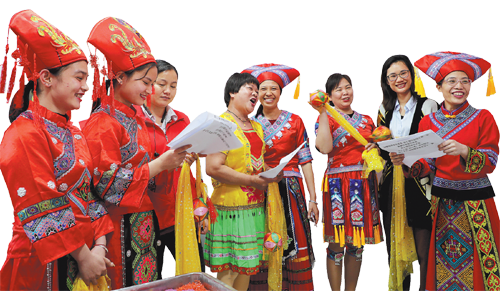
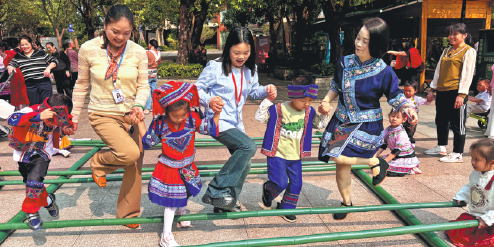
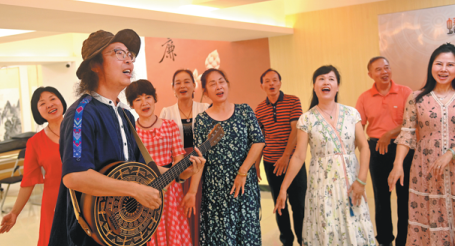
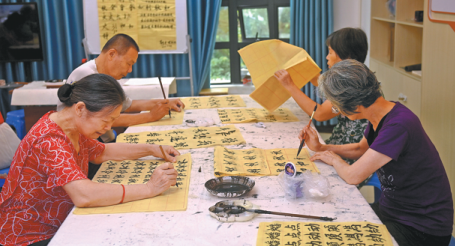
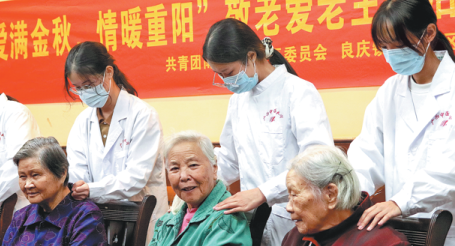
Today's Top News
- Trump's new 'Board of Peace' takes shape at Davos
- Unilateralism not the solution to global challenges and won't make US great again
- China's grain output hits new high in 2025
- Trump drops EU tariff threat after deal framework over Greenland in Davos
- China's message in Davos draws praise
- Consensus, not coercion, key to Ukraine crisis






























